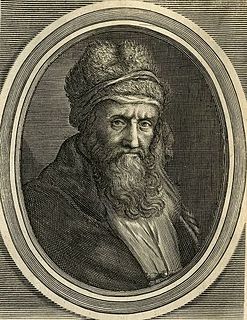 W
WJulia Cornelia Salonina was an Augusta of the Roman Empire, married to Roman Emperor Gallienus and mother of Valerian II, Saloninus, and Marinianus.
 W
WDiogenes Laërtius was a biographer of the Greek philosophers. Nothing is definitively known about his life, but his surviving Lives and Opinions of Eminent Philosophers is a principal source for the history of ancient Greek philosophy. His reputation is controversial among scholars because he often repeats information from his sources without critically evaluating it. He also frequently focuses on trivial or insignificant details of his subjects' lives while ignoring important details of their philosophical teachings and he sometimes fails to distinguish between earlier and later teachings of specific philosophical schools. However, unlike many other ancient secondary sources, Diogenes Laërtius generally reports philosophical teachings without attempting to reinterpret or expand on them, which means his accounts are often closer to the primary sources. Due to the loss of so many of the primary sources on which Diogenes relied, his work has become the foremost surviving source on the history of Greek philosophy.
 W
WDiophantus of Alexandria was an Alexandrian mathematician, who was the author of a series of books called Arithmetica, many of which are now lost. His texts deal with solving algebraic equations. While reading Claude Gaspard Bachet de Méziriac's edition of Diophantus' Arithmetica, Pierre de Fermat concluded that a certain equation considered by Diophantus had no solutions, and noted in the margin without elaboration that he had found "a truly marvelous proof of this proposition," now referred to as Fermat's Last Theorem. This led to tremendous advances in number theory, and the study of Diophantine equations and of Diophantine approximations remain important areas of mathematical research. Diophantus coined the term παρισότης (parisotes) to refer to an approximate equality. This term was rendered as adaequalitas in Latin, and became the technique of adequality developed by Pierre de Fermat to find maxima for functions and tangent lines to curves. Diophantus was the first Greek mathematician who recognized fractions as numbers; thus he allowed positive rational numbers for the coefficients and solutions. In modern use, Diophantine equations are usually algebraic equations with integer coefficients, for which integer solutions are sought.
 W
WEusebius of Caesarea, also known as Eusebius Pamphili, was a historian of Christianity, exegete, and Christian polemicist. He became the bishop of Caesarea Maritima about AD 314. Together with Pamphilus, he was a scholar of the Biblical canon and is regarded as one of the most learned Christians of his time. He wrote Demonstrations of the Gospel, Preparations for the Gospel and On Discrepancies between the Gospels, studies of the Biblical text. As "Father of Church History", he produced the Ecclesiastical History, On the Life of Pamphilus, the Chronicle and On the Martyrs. He also produced a biographical work on Constantine the Great, the first Christian Emperor, who was augustus between AD 306 and AD 337.
 W
WSaint George, also George of Lydda, was a Christian who is accepted as a saint in Christianity. According to traditional rumors, he was a soldier in the Roman army. His parents were Christians of Greek origin. His father, Gerontius, was a Cappadocian serving in the Roman army. His mother, Polychronia, was a Christian from the city of Lod in Palestine. Saint George was a soldier of Cappadocian Greek origins, member of the Praetorian Guard for Roman emperor Diocletian, who was sentenced to death for refusing to recant his Christian faith. He became one of the most venerated saints and megalomartyrs in Christianity, and he has been especially venerated as a military saint since the Crusades.
 W
WHeliodorus of Emesa was a Roman writer for whom two ranges of dates are suggested, either about the 250s AD or in the aftermath of Emperor Julian's rule, that is shortly after 363. He is known for the ancient Greek novel called the Aethiopica (Αἰθιοπικά), sometimes called "Theagenes and Chariclia".
 W
WIrenaeus was a Greek bishop noted for his role in guiding and expanding Christian communities in what is now the south of France and, more widely, for the development of Christian theology by combating heresy and defining orthodoxy. Originating from Smyrna, he had seen and heard the preaching of Polycarp, the last known living connection with the Apostles, who in turn was said to have heard John the Evangelist.
 W
WPlotinus was a major Hellenistic philosopher who lived in Roman Egypt. In his philosophy, described in the Enneads, there are three principles: the One, the Intellect, and the Soul. His teacher was Ammonius Saccas, who was of the Platonic tradition. Historians of the 19th century invented the term Neoplatonism and applied it to Plotinus and his philosophy, which was influential during Late Antiquity and the Middle Ages. Much of the biographical information about Plotinus comes from Porphyry's preface to his edition of Plotinus' Enneads. His metaphysical writings have inspired centuries of Pagan, Jewish, Christian, Gnostic, and Islamic metaphysicians and mystics, including developing precepts that influence mainstream theological concepts within religions, such as his work on duality of the One in two metaphysical states.